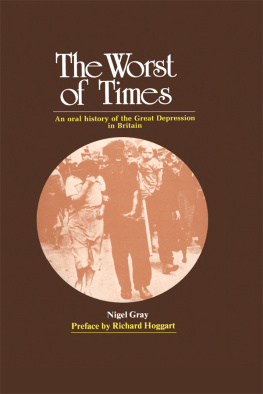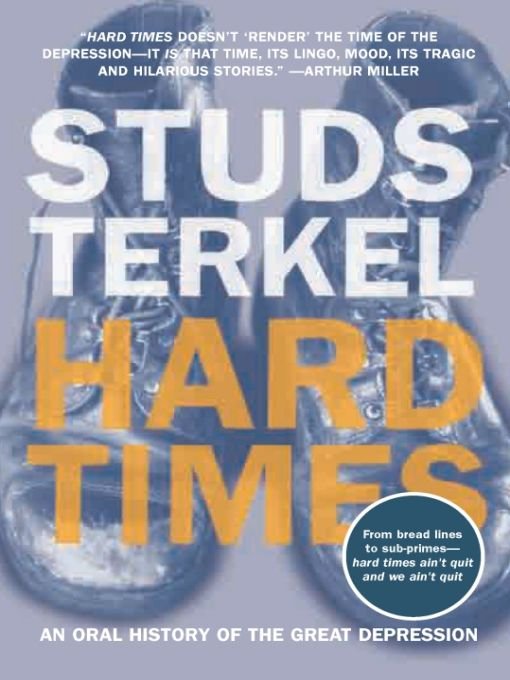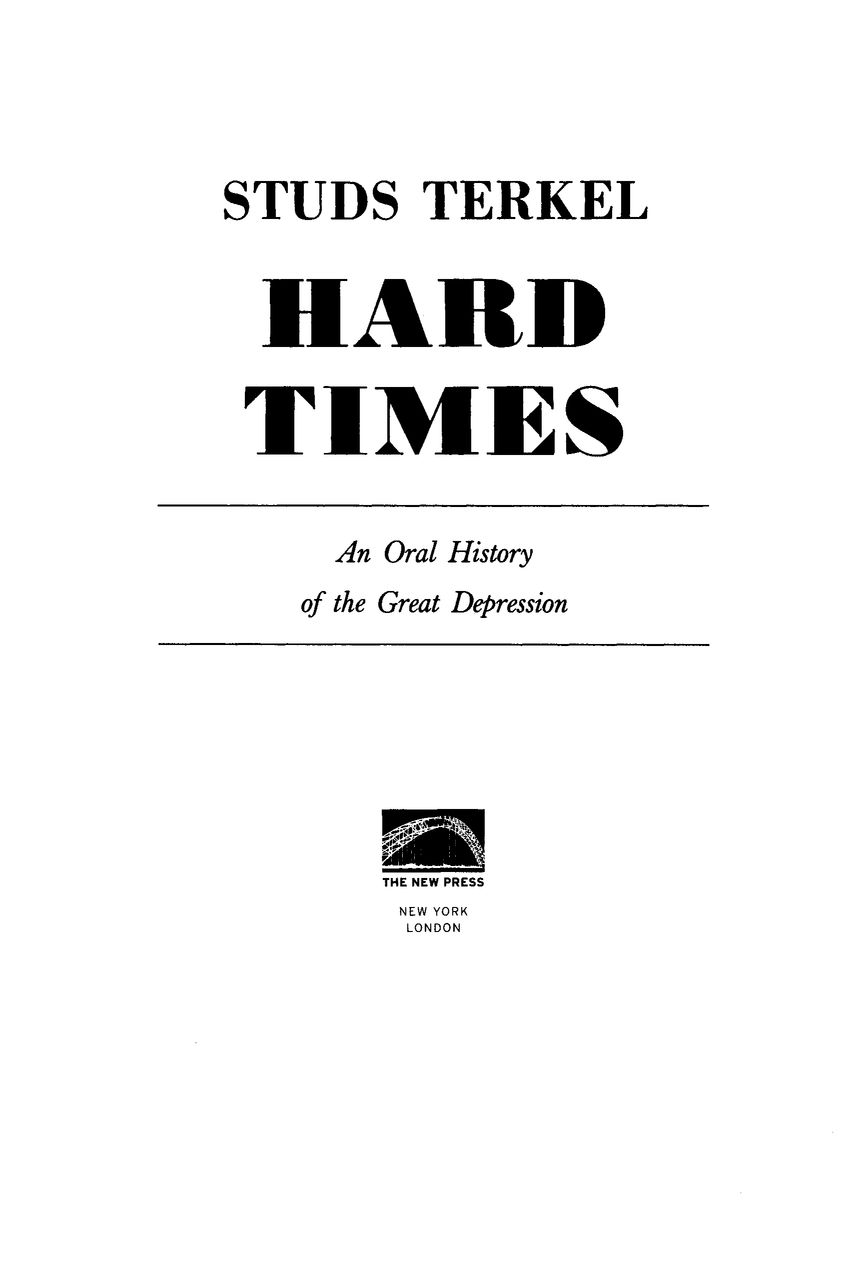Table of Contents
OTHER BOOKS BY STUDS TERKEL
American Dreams
Lost and Found
Division Street
America
Giants of Jazz
The Good War
An Oral History of World War II
Hope Dies Last
Keeping the Faith in Troubled Times
My American Century
Race
How Blacks and Whites Think and Feel
About the American Obsession
The Spectator
Talk About Movies and Plays
with the People Who Make Them
Talking to Myself
A Memoir of My Times
Will the Circle Be Unbroken?
Reflections on Death, Rebirth, and Hunger for a Faith
Working
People Talk About What They Do All Day and
How They Feel About What They Do
For my wife, my son, and my editor
ACKNOWLEDGMENTS
FRIENDS, acquaintances and, in astonishing number, strangers were gracious in offering suggestions. Without their hunches and tips, this work may not have been possible. Among these casual scouts: Richard Lamparski, Robert Cromie, Herman Kogan, Mike Royko, Lew Frank, Jr., Lucy Fairbank, Robert Sherrill, Phyllis Jackson, James Patton, Clifford and Virginia Durr, John Dierkes, Lou Gilbert, Phil McMartin, Sanka Bristow, Harry Bouras, King Solomon, Brendan McMahon, Earl Doty, Lou Abraham, Elizabeth Cooper, Jesse Prosten and Leon Beverly.
As in a previous work, Division Street: America, it was Cathy Zmuda, who did more than transcribe the hundreds of thousands of spoken words onto pages. She offered gratuitous editorial comments and thus provided me with a perspective that might otherwise have been missing.
My colleagues at radio station WFMT, notably Norm Pellegrini, Ray Nordstrand and Lois Baum, were remarkably understanding and ingenious during my leaves of absence. My daily programs, re-broadcasts, had an air of contemporaneity, thanks to them. My gratitude, too, to Jim Unrath for beyond-the-call-of-duty chores as my companion and chauffeur, during a memorable trip through Arkansas.
Especially am I grateful to my editor, Andr Schiffrin, whose idea this was. His insistence and quiet encouragement are evident in all these pages. And to his perceptive associates, Verne Moberg and Linda Faulhaber, for their bright-eyed look at what was becoming burdensome mattera salute.
Foreword
(January-February 1986)
Hard times come again no more...
As these words are being written, the Stephen Foster lyric rolls around in my head like a loose cannonball.
It is early in 1986, yet the Dirty Thirties come to mind. The bleak decade was so defined by a long-gone Congressman, whose remembrances you will find in these pages.
How come this foreboding reflection? The Six Oclock News and the financial sections of our most respected journals inform us, via Administration handouts, that things have seldom looked better. Even the phrase BOOM YEAR is occasionally headlined in a spirit of cheery prophecy.
True, there is the casual caveat, solemnly offered: something to do with deficits. But aside from the warnings of the usual Cassandras, its nothing to cause sleepless nights. Its too arcane a word anyway, an accountants term. Its nothing like hunger or homeless. These shadow words appear back in the feature pages, as human interest stories, adjacent to the gossip columns and theatrical news.
Up front are IMPORTANT developments. Look at the market. Stocks jump another 12... boosting the Dow-Jones industrial average to a record and proving that optimism over economic growth and corporate earnings remains high. Look at Dow-Jones. Look at the corporate ads, offered with an air of Responsibility. Look at the bright and morning faces of Business Administration School graduates, attach cases responsibly in hand, as they commute to the bustling office and the even more bustling Floor.
Unavoidably, you look at the face of the farmer as he is caught by the TV camera. You know the one: the desperate Iowan, who killed his neighbor and himself. I believe a minor bank official got it, too. It wasnt his fault either. He was as distraught as the man who killed him. It was bigger than both of them.
Last month, in Union County, which has the richest land in South Dakota, a young Farmers Home Administration supervisor killed his wife, daughter, son and dog while they slept, then went down to his office and shot himself dead. He left a note: The job has got pressure on my mind, pain on left side.... Because he was an out-of-stater, the F.H.A. moved him about the state, apparently figuring he would be more willing to get tough with local farmers who were behind on their loan payments than would a native South Dakotan.
Who do I shoot? cried out Muley Graves, Steinbecks near-crazed Okie, as he was being bulldozed off the land. God, I dont know, replied the towns bank officer, who was going sort of crazy himself.
Muley was a small farmer of the Thirties. The Iowan was a small farmer of the Eighties. Though a half-century separates them, their tethers end was commonly caused: neither could meet the payments.
Never since the Great Depression has the family farmer experienced such hardship, such despair. Scores of thousands are, with a growing sullenness, sampling the grapes of wrath. If help is not forthcoming one waysay, from Big Guvmintthey will seek another. Its a natural for the nearest con artist at hand.
Kearney, NebraskaHuddled under blankets last weekend in a cold, dark grain-storage shed, 200 men and women from around the Midwest listened intently to a tall man in a dark business suit pledge to take up arms in defense of dispossessed farmers. Christ told us he didnt come to bring peace but to bring us a sword, said the boyishly handsome 32-year-old Larry Humphreys. When the banking system collapses, the logical thing to do is to come out bearing arms.... Its pretty much common knowledge that most of the international banks are Jewish....
There was farm anger and militancy in the Thirties too, but with a difference. The Posse Comitatus and the Aryan Nation would have been hooted off the wheatlands as clownish and diversionary. There was some awareness of root causes, an awareness that has diminished considerably during a half-century of amnesia. The farmers of the Thirties drew a bead on Washington.
Emil Loriks of South Dakota remembers: The situation was tense in ten or eleven states. You could almost smell the powder. When Governor Herring of Iowa called out the militia, Milo Reno said, Hold off. Ill not have the blood of innocent people on my hands. We had a heck of a time getting the farmers off Highway 75. There were probably a thousand of them out there. Reno called a meeting at Sioux City. About thirty thousand farmers showed up. We decided to go to Washington and settle for a farm program. If Roosevelt hadnt come in in 32, wed a been in real trouble.
Then and Now. In the Thirties, an Administration recognized a need and lent a hand. Today, an Administration recognizes an image and lends a smile. Larry Humphreys recognizes a bitter fruit, ripe for the picking.
The latest communique from Chicagos Far South Side informs us that the Southworks of U.S. Steel is laying off six thousand. That leaves a thousand on the jobfor the time being. It had not been unexpected. The community had known it was coming: merely a few more thousand swelling the roster of idle hands in heavy industry.





